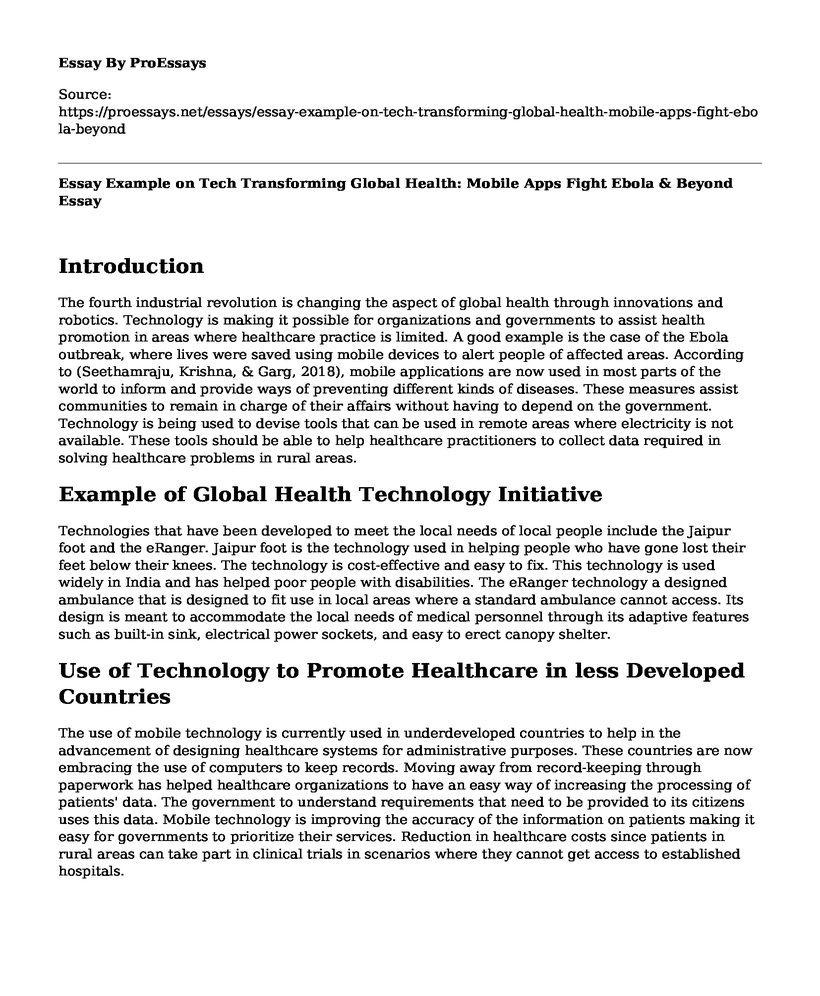Introduction
The fourth industrial revolution is changing the aspect of global health through innovations and robotics. Technology is making it possible for organizations and governments to assist health promotion in areas where healthcare practice is limited. A good example is the case of the Ebola outbreak, where lives were saved using mobile devices to alert people of affected areas. According to (Seethamraju, Krishna, & Garg, 2018), mobile applications are now used in most parts of the world to inform and provide ways of preventing different kinds of diseases. These measures assist communities to remain in charge of their affairs without having to depend on the government. Technology is being used to devise tools that can be used in remote areas where electricity is not available. These tools should be able to help healthcare practitioners to collect data required in solving healthcare problems in rural areas.
Example of Global Health Technology Initiative
Technologies that have been developed to meet the local needs of local people include the Jaipur foot and the eRanger. Jaipur foot is the technology used in helping people who have gone lost their feet below their knees. The technology is cost-effective and easy to fix. This technology is used widely in India and has helped poor people with disabilities. The eRanger technology a designed ambulance that is designed to fit use in local areas where a standard ambulance cannot access. Its design is meant to accommodate the local needs of medical personnel through its adaptive features such as built-in sink, electrical power sockets, and easy to erect canopy shelter.
Use of Technology to Promote Healthcare in less Developed Countries
The use of mobile technology is currently used in underdeveloped countries to help in the advancement of designing healthcare systems for administrative purposes. These countries are now embracing the use of computers to keep records. Moving away from record-keeping through paperwork has helped healthcare organizations to have an easy way of increasing the processing of patients' data. The government to understand requirements that need to be provided to its citizens uses this data. Mobile technology is improving the accuracy of the information on patients making it easy for governments to prioritize their services. Reduction in healthcare costs since patients in rural areas can take part in clinical trials in scenarios where they cannot get access to established hospitals.
Nursing Role in Supporting Global Health
Nurses have a role in ensuring that they take part in eliminating health inequalities. They are, therefore, responsible for ensuring that self-awareness on health reaches every individual in societies that are not exposed. The nurses are required to be part of ensuring an understanding of the diverse cultures of populations. According to (Anazor, 2012) nurses are tasked to understand what social factors are negatively preventing such populations from having access to healthcare. Healthcare is no longer about the treatment of patients, and nurses are now expected to contribute to ensuring that their patients are elevated from poverty and social inequalities that are leading contributors to poor healthcare globally. Nurses often get in contact with communities they are serving, offering them a chance to ensure these communities have access to healthcare through advocating for equality. Nurses help in birth delivery in rural areas where the local communities do not have an opportunity to access doctors. Primary care is remote areas with high rates of poverty is delivered by nurses. Nurses engage in partnerships and collaboration to work towards ensuring they resolve the current global challenge of shortage of nurses with a strong education background.
References
Anazor, C. (2012). Preparing nurse leaders for global health reforms. Nursing Management (through 2013), 19(4), 26-8. Retrieved from https://search.proquest.com/docview/1026851291?accountid=45049
Seethamraju, R., Krishna, S. D., & Garg, S. (2018). Intention to use a mobile-based information technology solution for tuberculosis treatment monitoring - applying a UTAUT model. Information Systems Frontiers, 20(1), 163-181. doi:http://dx.doi.org/10.1007/s10796-017-9801-z
Cite this page
Essay Example on Tech Transforming Global Health: Mobile Apps Fight Ebola & Beyond. (2023, Mar 02). Retrieved from https://proessays.net/essays/essay-example-on-tech-transforming-global-health-mobile-apps-fight-ebola-beyond
If you are the original author of this essay and no longer wish to have it published on the ProEssays website, please click below to request its removal:
- Case Study Example of a Sepsis/SIRS Patient
- Children Vaccination Essay
- Pressure Ulcer Paper Example
- Essay on Importance of Informed Consent, Confidentiality, and Ethical Decision
- Inquiry Methods in Aircraft Accidents Paper Example
- Human Papillomavirus: Cervical Cancer, Genital Warts, Vaccine Options - Essay Sample
- Paper on Comparing US & Canadian Healthcare Systems: A Look at GDP Expenditures







